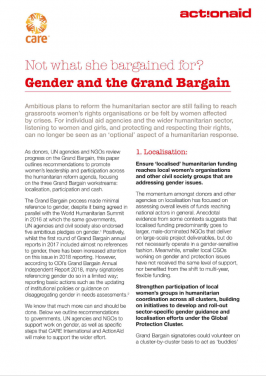Not what she bargained for?
Gender and the Grand Bargain. Why plans to reform the humanitarian sector are failing to be felt by women affected by crises.
Executive summary
Ambitious plans to reform the humanitarian sector are still failing to reach grassroots women's rights organisations or be felt by women affected by crises. For individual aid agencies and the wider humanitarian sector, listening to women and girls, and protecting and respecting their rights, can no longer be seen as an 'optional' aspect of a humanitarian response.
As donors, UN agencies and NGOs review progress on the Grand Bargain, this paper outlines recommendations to promote women's leadership and participation across the humanitarian reform agenda, focusing on the three Grand Bargain work streams: localisation, participation and cash.
The Grand Bargain process made minimal reference to gender, despite it being agreed in parallel with the World Humanitarian Summit in 2016. We know that much more can and should be done. Below we outline recommendations to governments, UN agencies and NGOs to support work on gender, as well as specific steps that CARE International and ActionAid will make to support the wider effort.
